At the ripe old age of 92, Ryland Headley must have thought he’d be taking his darkest secret to the grave.
For nearly six decades, the former British Rail worker had got away with the brutal rape and murder of 75-year-old Louisa Dunne at her home in Bristol in 1967.
But Headley hadn’t banked on a decision in 2023 by Avon and Somerset Police to revisit the unsolved case – or the determination of one of their detectives who, upon discovering Mrs Dunne’s skirt in a box of evidence stored in police archives, realised there might finally be a chance of cracking this extraordinary cold case.
Today, Headley was finally found guilty of Mrs Dunne’s rape and murder by a jury at Bristol Crown Court, almost exactly 58 years to the day that he took the mother-of-two’s life. It’s thought to be the longest running cold case ever to be solved by the police.
Jo Smith, from the force’s major crime review squad, told the Mail this week how she immediately realised the significance of the discovery she made two years ago.
‘I understood we were potentially sitting on something that could finally yield answers and help us find the killer,’ she said.
The box containing Mrs Dunne’s blue skirt was one of three Smith found. Another held the original crime scene photographs, including images of Mrs Dunne’s body, which showed she had been wearing the skirt when she was killed. Hairs taken from the pensioner’s body had also been preserved.
Incredibly, forensic scientists were able to obtain a full DNA profile from a semen stain on the back of the skirt.
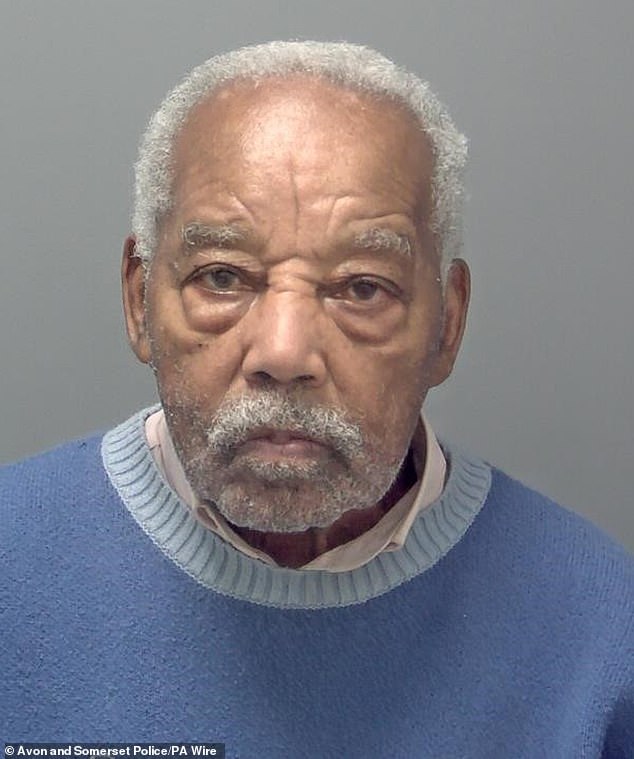
At the ripe old age of 92, Ryland Headley (pictured) must have thought he’d be taking his darkest secret to the grave
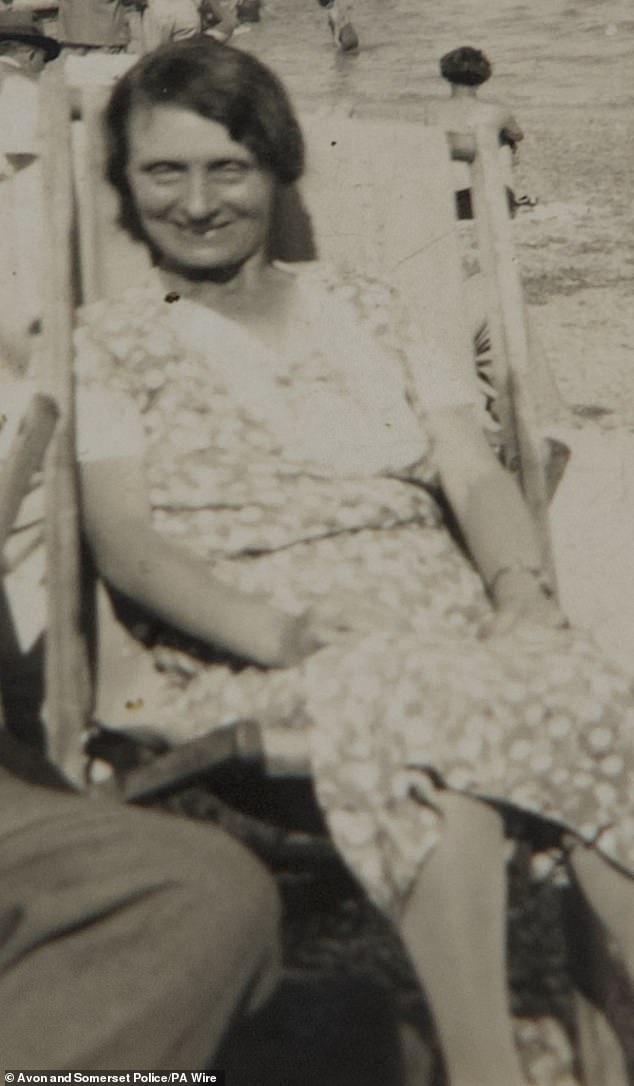
For nearly six decades, the former British Rail worker had got away with the brutal rape and murder of 75-year-old Louisa Dunne (pictured in 1919) at her home in Bristol in 1967
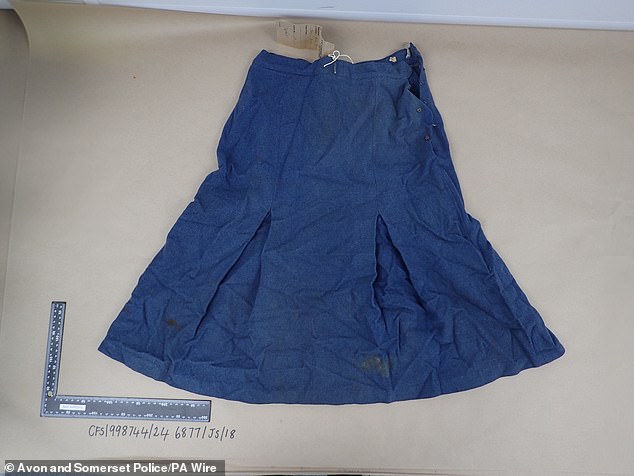
Headley hadn’t banked on the determination of one of a detectives who, upon discovering Mrs Dunne’s skirt (pictured) in a box of evidence stored in police archives, realised there might finally be a chance of cracking this extraordinary cold case
But it was Headley himself who had already, unwittingly, handed detectives the final piece of the puzzle.
In 2012, he was arrested, but not charged, in connection with what police say was an ‘unrelated offence’ and DNA from the cheek swab he gave Suffolk Police was uploaded onto the national database.
When, 12 years later, Andrew Parry, a senior forensic scientist, added the DNA profile from Mrs Dunne’s skirt, it perfectly matched Headley’s sample.
It was on the back of Parry’s finding that ‘it is in the order of one billion times more likely if the sperm cells originated with Headley rather than if they had not’ that the widowed father-of-three now finds himself facing his remaining years in jail when he is sentenced today.
Ever since Headley’s dramatic arrest last November, the Mail has been investigating this historical case in a bid to understand how an apparently contented family man lived a double life as a serial sex offender.
For Mrs Dunne’s 78-year-old granddaughter, Mary Dainton, Headley’s conviction closes a chapter which has long haunted her family. Outside court today, she said: ‘I was just 20 years old when my grandmother died and I’m now almost the same age as she was when she was killed.
‘Louisa’s brutal death had a big impact on my mother and her wider family. I don’t think my mother ever recovered from it. The anxiety clouded the rest of her life.
‘When people found out about the murder, including friends, they withdrew – there is a stigma attached to rape and murder in my experience, so I have rarely talked to anyone about this until now.
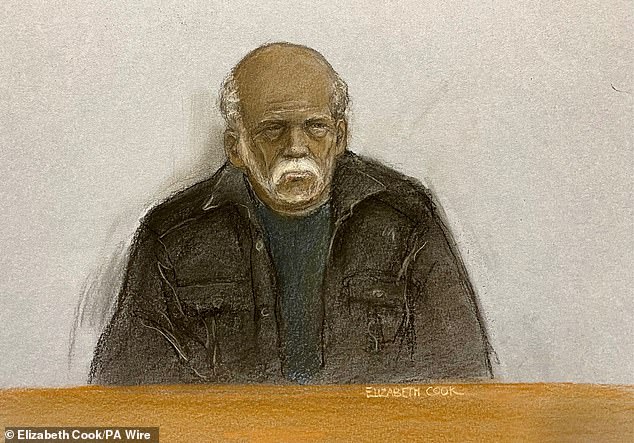
Headley himself unwittingly handed detectives the final piece of the puzzle (Pictured: A court sketch of Headley)
‘It saddens me deeply that all the people who knew and loved Louisa are not here to see that justice is being done.’
Headley himself has never said anything about his crimes.
Over the past two weeks, the frail pensioner listened attentively to court proceedings via a special hearing loop but has shown no sign of any emotion.
Clearly adept at hiding his true nature, at least one member of Headley’s own extensive family still refuses to accept his guilt and insists he is ‘the nicest, kindest man’.
Another relative describes him as being ‘a little mouse’ who played second-fiddle to his ‘matriarch’ wife.
Had it not been for his sick crimes, Headley’s life story might indeed have been one to inspire future generations.
Born into a Jamaican farming family in September 1932, Ryland Lindbergh Headley arrived at Liverpool docks aboard the Reina del Mar on July 6, 1956, one of the Windrush generation of migrants.
He found work in Bristol with British Rail, clearing out the coal ash from steam locomotive fireboxes, and in June 1958 he married nurse Maggie Welch who had arrived in the UK from Barbados in 1953.
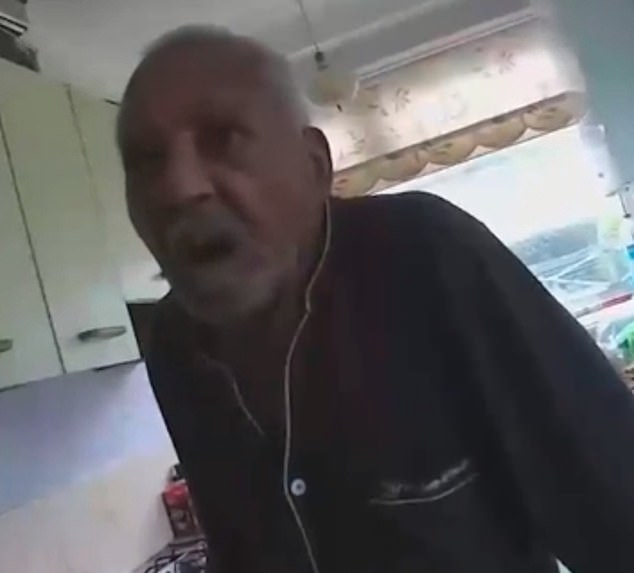
Ever since Headley’s dramatic arrest last November, the Mail has been investigating this historical case in a bid to understand how he lived a double life as a serial sex offender (Pictured: Police bodycam footage captured a startled Headley being detained last year)
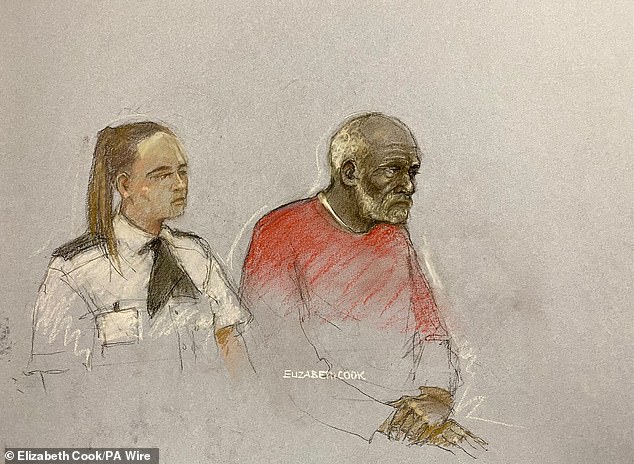
Over the past two weeks, the frail pensioner listened attentively to court proceedings via a special hearing loop but has shown no sign of any emotion (Pictured: A court sketch of Headley)
Their daughter was born three months later, a sister for two children from Maggie’s previous marriage. A son followed and then another daughter. With the couple both working shifts, caring for their expanding brood was no easy feat.
By the mid-1960s Maggie had taken the children back to Barbados where they attended boarding school, paid for by her wealthy sugar company manager father. Over the years that followed, she would leave Headley, known as ‘Riley’ by his family, alone in Bristol for months at a time.
‘Maggie was the one who wore the trousers,’ a relative told the Mail this week. ‘She would always take over. She was a strong matriarch; a big, flamboyant, feisty Barbadian woman. It was her way or the highway.
‘Riley on the other hand was like a little mouse. He never spoke except to say hello or goodbye.
‘He always seemed to be in his own world. He never joined in with anecdotes or reminiscences or jokes. He just sat quietly in the corner.’
The relative said that because of the couple’s shift patterns, Headley would have ‘had the opportunity to get up to no good’.
‘They say rape is about power and control. Well, Maggie never let him have any of that. Perhaps this was his way of taking it back again?’
At the time of Mrs Dunne’s murder Maggie and Headley, then aged 34, were living in a rented house in the Montpelier area of Bristol. Louisa Dunne lived around a mile-and-a-half away in Britannia Road in the city’s Easton district.
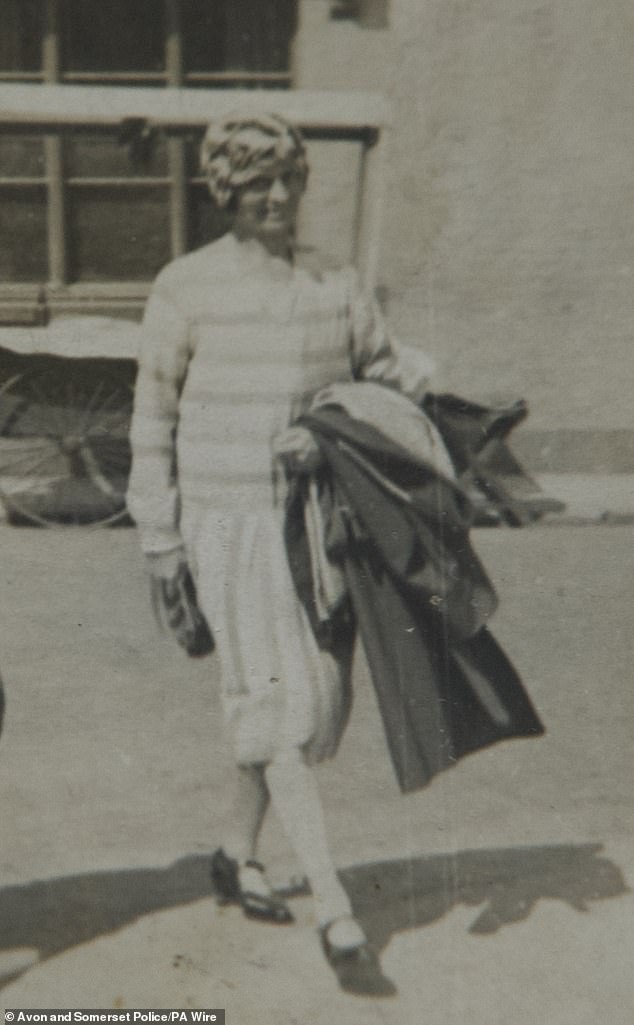
Mrs Dunne (pictured) spent the evening before her death with her 79-year-old friend Alice Clarke, who later recalled that her friend’s last words were: ‘Good night. God bless. I don’t know when I’ll be seeing thee’
Born in 1892, she had been twice married and widowed. Her first husband was a respected council alderman with whom she had two daughters. The 75-year-old was just 5ft 3in tall and weighed less than 7st.
Mrs Dunne spent the evening before her death with her 79-year-old friend Alice Clarke, who later recalled that her friend’s last words were: ‘Good night. God bless. I don’t know when I’ll be seeing thee.’
In the middle of the night, several neighbours heard a muffled scream but saw nothing to suggest a disturbance. The following morning, they became concerned they hadn’t seen Mrs Dunne. They noticed, too, that a sash window was open at the front of the house.
When one looked in and saw Mrs Dunne’s legs on the floor, she climbed in to find her ‘cold as ice’ body, with her underwear around her ankles and a stocking across her neck.
Mrs Dunne’s cause of death was recorded as asphyxia due to strangulation and pressure on the mouth. Swabs taken from her vagina tested positive for semen.
While Mrs Dunne’s clothing was placed in bags and labelled, the key piece of evidence at the time was a partial left hand palm print found on another window her killer had tried to open.
Over the following months, police took prints from 19,286 local men aged between 15 and 60. But Headley wasn’t among them because his home sat just outside the search area.
In the wake of Mrs Dunne’s murder, and with their children still in Barbados, he and Maggie moved, first to Brent in north-west London then Ipswich in the early 1970s, where he continued to work for British Rail.
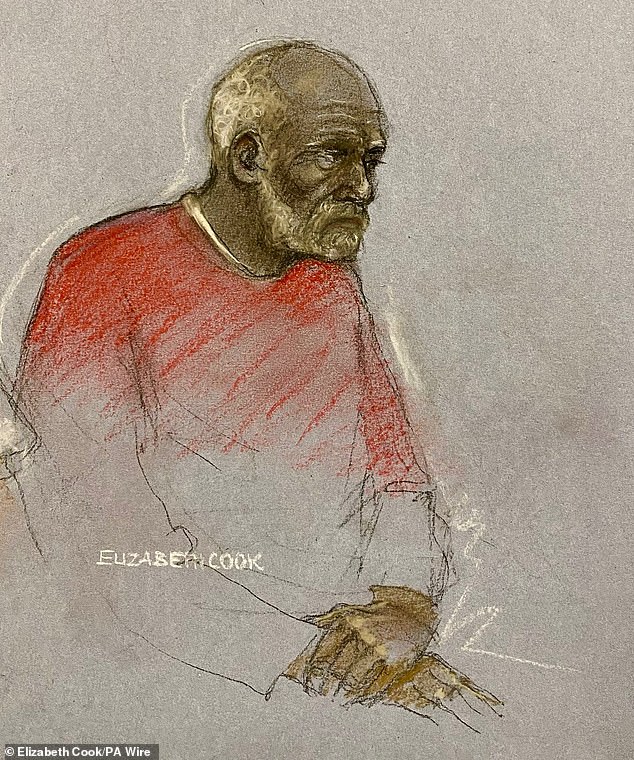
After Headley murdered Mrs Dunne, police took prints from 19,286 local men aged between 15 and 60. But Headley wasn’t among them because his home sat just outside the search area (Pictured: A court sketch of Headley)
Having got away with murder, Headley might have been expected to keep a low profile but by 1977 – the Queen’s Silver Jubilee Year – Suffolk Police suspected they had a serial sex attacker in their midst after attacks on elderly women.
Home Office psychiatrist Dr David Muller concluded that the attacks, by a ‘very disturbed man’, ‘may be a campaign of revenge against females for some reason hidden in his past’ and warned that the rapist was ‘cunning, devious and could commit murder if he meets with resistance’.
Headley was snared thanks to fingerprint evidence.
He pleaded guilty to two rapes – on an 84-year-old and a 79-year-old – at Ipswich Crown Court in 1978. He also asked for a further ten offences of overnight burglaries to be taken into account.
Both his rape victims are long dead but the statements they gave 48 years ago were read out in court during his latest trial. What Headley said before raping them was chilling indeed. To the 84-year-old, he spoke of wanting ‘to care for you’ before telling her that if she didn’t do what he wanted: ‘I’ll strangle you.’
He told the 79-year-old: ‘I’m going to make love to you,’ and ordered her to ‘kiss me, kiss me’.
She recalled: ‘I asked him if he would want anyone to do this to his mother.’
Headley replied: ‘If you do what I tell you it will be all right. If you don’t, then I’ll kill you.’
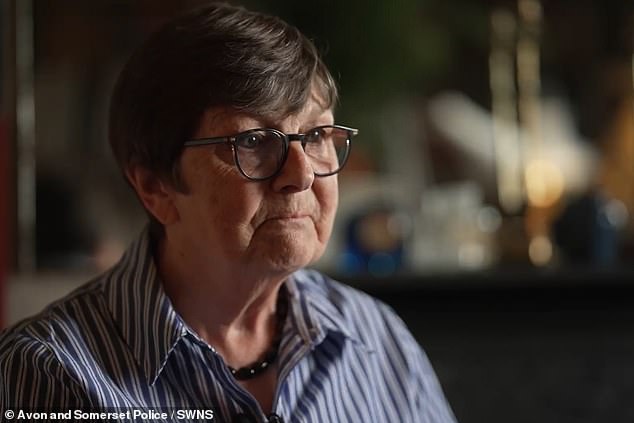
For Mrs Dunne’s 78-year-old granddaughter, Mary Dainton (pictured), Headley’s conviction closes a chapter which has long haunted her family
Former Detective Inspector Eric Hopes, who worked on the case at the time, told the Mail: ‘It’s still repugnant to me that a man should pick women of that age. He found them easy prey and not likely to report it, I suppose.’
Mr Hopes, now 93, said Headley’s victims were ‘very brave to come forward for a thing like that’.
The granddaughter of the 79-year-old victim was 16 when her ‘Nanna’ was raped, and told the Mail she was left covered in bruises after the vicious attack.
‘She was strong. She had lived through two world wars, she was a tough old thing,’ says 64-year-old Julie West, who still lives in Ipswich. ‘She never talked about what happened afterwards but I started to get severe panic attacks.’
When she heard about Headley’s arrest last year, she says: ‘I thought: ‘Ryland Headley? I know that name.’ I’d never forgotten it.’
Headley was handed a life sentence, reduced on appeal to seven years. Released in the early 1980s, he lied to his family that he’d been set free because he was innocent.
A close family member has told the Mail that his wife Maggie and their children never believed he was guilty.
‘He’s not that sort of person. He’s not like that,’ said the family member. ‘They didn’t believe he did any of the things they said he did. It was awful for his family.’
Maggie died in 2014 and until police came knocking at his door again in 2024, Headley lived quietly at their home in Clarence Road, Ipswich, tending to his garden.
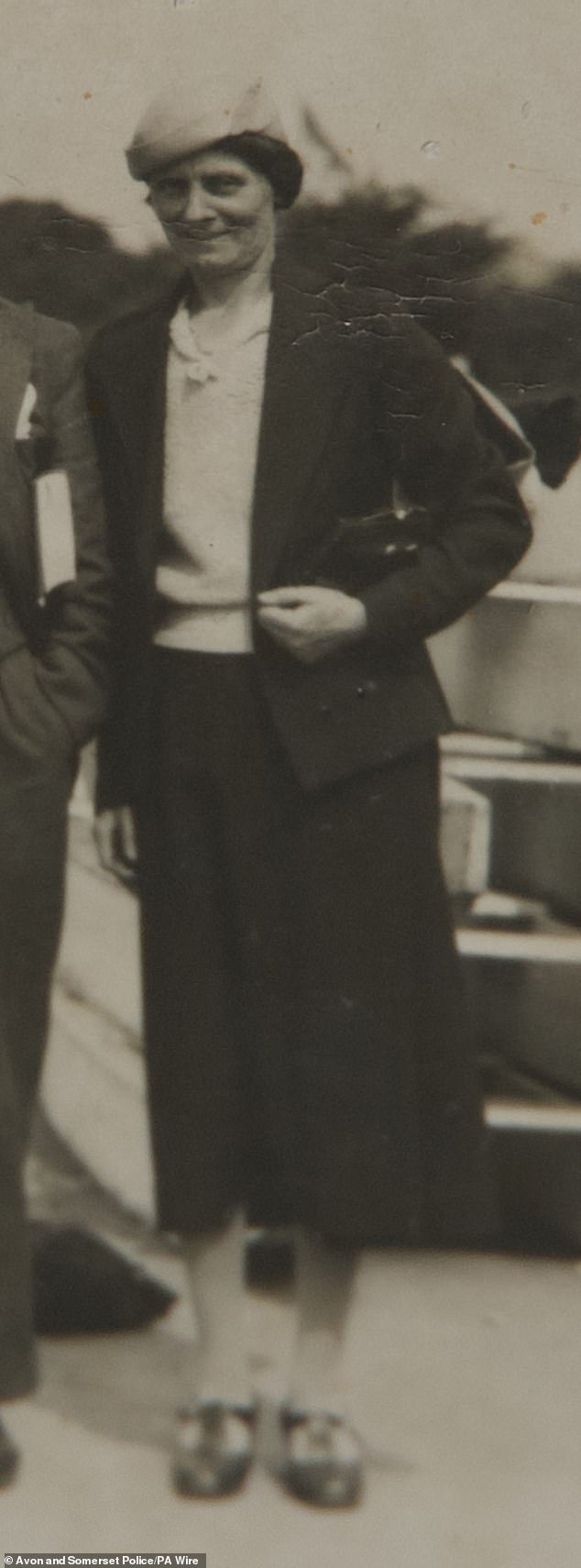
Headley was found guilty of Mrs Dunne’s rape and murder by a jury at Bristol Crown Court, almost exactly 58 years to the day that he took the mother-of-two’s life (Pictured: Mrs Dunne)
He made daily trips on foot to the shops, greeting neighbours he met along the way.
Among his acquaintances was former Ipswich town councillor Tom Ward, who sometimes walked with him.
‘He seemed like a nice chap,’ says 88-year-old Mr Ward. ‘He was a quiet bloke and never came out with anything too much. We just talked about things around here and politics. He never talked about children or family or his wife.’
Headley was still in his pyjamas when police knocked on the door last November.
He displayed little emotion as an officer explained they had come to arrest him, saying: ‘I don’t know what you are talking about. Very strange, very strange.’
The pensioner refused to answer questions during subsequent police interviews. In court, he also declined to take the stand.
But thanks to the unknown police officer who carefully bagged up Mrs Dunne’s skirt nearly 60 years ago, the DNA evidence against him was overwhelming. It was also found on hairs removed from Mrs Dunne’s body and his handprint was a match for the one found on her window.
During previous arrests Headley had provided his fingerprints but never given palm prints. On the 2012 form, it noted ‘arthritis in both wrists, palms not flexible’.
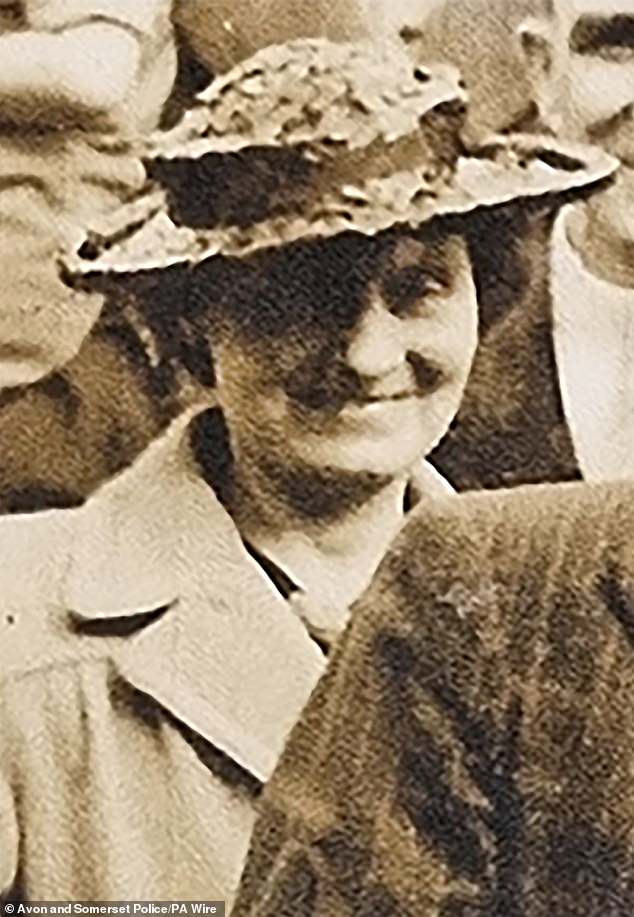
Thanks to the unknown police officer who carefully bagged up Mrs Dunne’s skirt nearly 60 years ago, the DNA evidence against Headley was overwhelming (Pictured is Mrs Dunne)
Because of his advanced age and delicate health, Headley was treated with kid gloves throughout his two-week trial.
As a younger man, he, of course, showed no such compassion for his elderly victims.
Lead officer Det Inspector Dave Marchant said today: ‘Hearing the voices of the victims of his 1977 offences [was] just incredibly powerful and harrowing.
‘I think it gives us an insight into probably what happened within 58 Britannia Road to some degree.
‘It just gave a sense of how depraved and predatory Mr Headley’s behaviour is.’
He added that Avon and Somerset Police are now liaising with other forces, as well as the National Crime Agency, in case Headley committed other crimes.
‘He’s a serial offender and it would be foolish of us to draw a line under this and say ‘job done’,’ said Marchant. ‘We need to identify if there is anything else out there. It doesn’t matter how old a case is, whether it’s from this morning, a year ago or in this case, nearly 60 years.’
What this week’s verdict shows above all is that those who commit murder will be pursued to the grave. It serves as a poignant reminder that victims like Louisa Dunne are not to be forgotten, however much Headley thought he could leave his horrific crime buried in the past.












